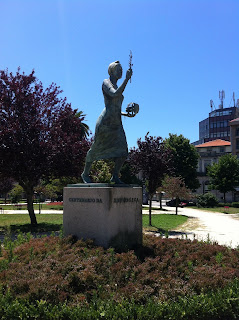Northern Portugal is filled with interesting figurative sculpture. Mostly in bronze, they range from 19th century pieces up to the contemporary. I am not sure how the Portuguese managed to continue this wonderful tradition while the rest of Europe fell to the curse of the postmodern but I suspect it may have to do with the strong Catholic traditions embeded in the culture while Salazar was ruling the country. From the city to small village you will find interesting and often beautiful works.
To start this series lets take a look at Praça da República in Porto.The square was opened in the latter half of the 18th century. Shortly after the military headquarters was built on the north side and the area was used for military maneuvers. In 1910, upon the proclamation of the Republic, the square was further developed with the addition of flower beds and the sculptures below.
To start this series lets take a look at Praça da República in Porto.The square was opened in the latter half of the 18th century. Shortly after the military headquarters was built on the north side and the area was used for military maneuvers. In 1910, upon the proclamation of the Republic, the square was further developed with the addition of flower beds and the sculptures below.
According to the plaque, this Bacchus was erected in 1916 to commemorate the sixth anniversary of the Republic of Portugal. The sculptor was António Teixeira Lopes.
This sculpture is titled, "Padre Américo". Américo Monteiro de Aguiar, better known by Father Américo (Penafiel, Galegos, 23 October 1887 - Campo, Valongo, July 16, 1956), was an important Portuguese benefactor who dedicated his life to the most deprived. Sculpture by Henrique Arujo Moreira.
This allegorical sculpture by Bruno Marques commemorates the 100 anniversary of the Portuguese Republic. She is holding a palm branch (signifying peace) and a crest of Portugal.






No comments:
Post a Comment